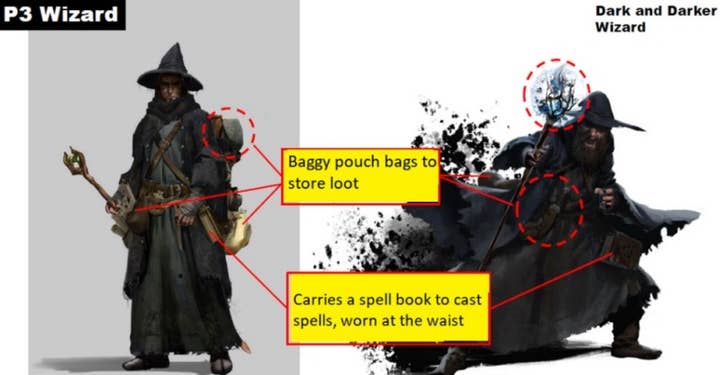Are developers allowed to copy themselves? | This Week in Business
Nexon's copyright infringement lawsuit against Dark and Darker takes exception to Ironmace's rehashed fantasy tropes and Unreal Engine Marketplace assets
One of the fun parts of being a games journalist for a trade site is that you get to semi-regularly read through impossibly dense legal filings full of painstakingly detailed arguments about the finer points of contract law.
Another of the fun parts is that being a games journalist for a trade site eventually breaks your brain so you really do think that counts as fun.
So let's have some fun this week and look through Nexon Korea's lawsuit against Dark and Darker developer Ironmace accusing the studio of misappropriation of trade secrets and copyright infringement.
Before we start, let's be clear I have no legal training and my assessment of this case should not be trusted or acted upon in any way, shape or form. All I have is years of looking through lawsuits like this and the aforementioned broken brain that derives glee from the kind of brazenly inconsistent or far-fetched arguments companies often make in lawsuits.
As much fun as it is to think of legal cases as Phoenix Wright-like logic puzzles laser-focused on a central question with one clear and true answer, the civil cases we see in the games industry are often better characterized as dueling legal teams armed with feces-shooting chainguns spraying down their rivals' walls to see what sticks.
QUOTE | "These proceedings are invalid because the structure of the Commission as an independent agency that wields significant executive power, and the associated constraints on removal of the Commissioners and other Commission officials, violates Article II of the US Constitution and the separation of powers." - Microsoft's lawyers fire back at the FTC's objection to the Activision Blizzard acquisition by arguing that the US consumer protection agency has no power to protect consumers.
Once the media picked up on that, Microsoft walked it back, essentially admitting it had taken a "quantity over quality" approach to its legal defense.
QUOTE | "We initially put all potential arguments on the table internally and should have dropped these defenses before we filed. We appreciated feedback about these defenses and are engaging directly with those who expressed concerns to make our position clear." - Microsoft public affairs spokesperson David Cuddy explains why the company revised its arguments to the FTC to drop the unconstitutional angle.
To put it another way, one of the terrifyingly huge global megacorps that has its fingers on nearly every aspect of our digital lives argued for the effective dissolution of the government agency created explicitly to protect people from unchecked giants of capitalism.
Gee, it sure is a good thing we have the shame of cultural opprobrium and a healthy, sane judiciary to keep bad actors in check these days, am I right?
[Reads virtually any day's top headlines.]
Oh.
See, I told you this would be fun!
Now let's get to the Nexon stuff.
Nexon says it spent 11 months working on a first-person action game internally referred to as The P3 Project. Then in July 2021 by Nexon's version of events, the game's director Ju-Hyun Choi and Nexon's director of game development Terence Seungha Park left the company and recruited about half of the development team (including most of the key team members) to go with them and start Ironmace with the intention of copying the project and finishing it as Dark and Darker.
In the way of evidence, Nexon relies on two things. The first is a detailed account of Choi transferring P3 project files to a private server saying he needed the exception to company IT policies to aid working from home during the pandemic. Nexon says permission was given early in the project, rescinded later on, and Choi refused to turn the servers over to Nexon for inspection so they fired him.
The company argues that the smoking gun will be found when Ironmace turns over Dark and Darker source code in the discovery process of the case, where it is confident it will find the game's code to be "substantially similar" to that of P3. But really, it's just guessing.
QUOTE | "In August 2022, a mere ten months after Ironmace was formed, Defendants released a demo of P3, now renamed Dark and Darker, for download on Steam. As described below, Ironmace could not have developed Dark and Darker so rapidly, unless it used Nexon's Trade Secrets to do so." – Nexon is assuming Ironmace did them dirty because yeah, ten months to put together Dark and Darker's playtest from scratch sounds pretty quick.
Nexon's lawsuit also criticized Ironmace's explanation about how it made it to the playtest so quick as "self-serving public statements," drawing a stark contrast to Nexon's own presumably altruistic and civic-minded lawsuit seeking damages and royalties.
There's also a small note about Nexon's employment agreement including "a one-year non-compete clause that prevents the employees from working in the same line of business that could potentially infringe on Nexon's trade secrets, without Nexon's prior consent," which seems like the sort of thing that would end this argument in a hurry, but which might not be enforceable.
I mention it here mostly because non-competes – particularly when applied to anyone but key personnel with golden parachutes to carry them through the non-compete term – reflect horribly on an employer.
The idea of widely applied non-compete clauses in an industry with notoriously little stability is extra distasteful when used by companies that aren't overly generous with pay.
STAT | More than 20 – The number of employees Nexon had working exclusively on P3 Project, according to the lawsuit.
STAT | $841,944 – The amount of money Nexon invested into P3 Project over the course of 11 months, according to the suit.
That would work out to a salary of just over $40,000 each for 21 people over the entire 11 months, but we can assume not everyone would have working on it for the whole stretch.
Still, I would have assumed Nexon's legal team would add in the costs of employee benefit packages, computer hardware, software licenses, and all the rest of the overhead to make that lost investment (and eventual award for damages) as impressive as possible.
If this is the best they can come up with and it includes Park and Choi's salaries as senior employees for the entire term, Nexon's generosity when it comes to compensation is unlikely to justify a non-compete clause in my eyes, at least.
(I'll also note that the money Nexon spent on P3 is less than 1% of the $100 million it threw into bitcoin in mid-2021, so let's not pretend a company with that kind of financial acumen was going to put it to better use.)
That's the boring bit.
The other half of Nexon's argument is more interesting, as it's the part that claims Ironmace has copied Nexon's particular creative expression of a player-vs-player-vs-enemy first-person shooter with RPG elements.
Nexon clearly acknowledges that P3 Project was inspired in part by Dungeons & Dragons, as its six character classes – cleric, ranger, barbarian, fighter, rogue, and wizard – were pulled from the dozen basic classes in the classic tabletop role-playing game. Dark and Darker is similarly inspired by Dungeons & Dragons and has essentially the same six classes.
QUOTE | "There is nothing inherent to Dungeons and Dragons-inspired video games that would compel a developer to select precisely the same six character classes that P3 selected. Indeed, there are more than 900 unique combinations of six character classes that a game developer could select from a set of twelve." – Nexon is very upset that Ironmace copied the same parts of the homework it already copied.
To back that up, Nexon showed side-by-side character comparisons of its own utterly unique and creative expressions of these classes, contrasted with Ironmace's clearly derivative knock-offs.
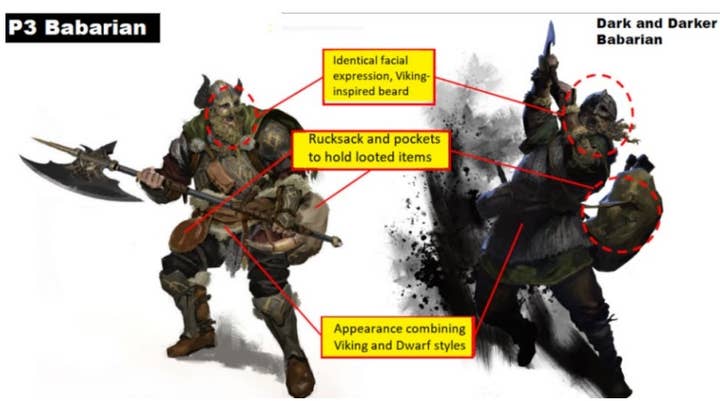
First, I love the fact they felt the need to highlight similarities between the two images.
Second, I love that their choices for the most damning copied elements of the design are some of the most bog-standard fantasy and video game tropes around. Wow, a screaming barbarian? A bag to hold stuff? Case closed, take these scumbags to jail already.
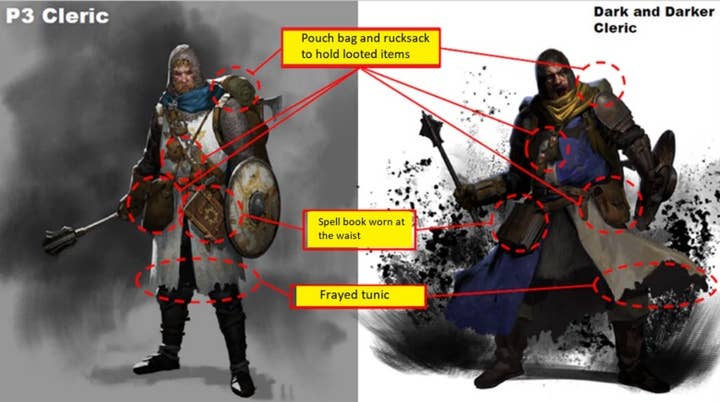
A frayed tunic and random pouches all over? Maybe the devs just read comic books in the '90s. I'm not impressed. Let's see what else they've got.
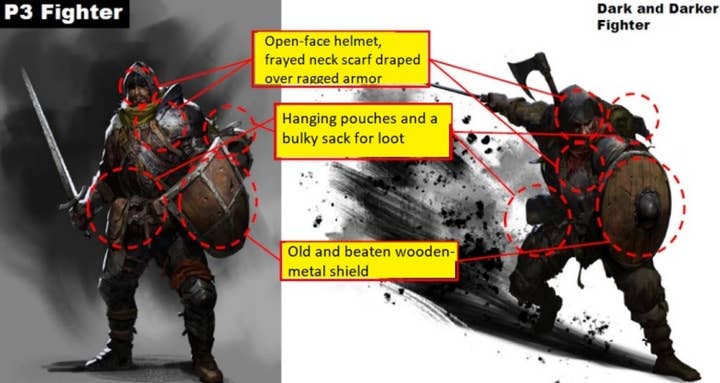
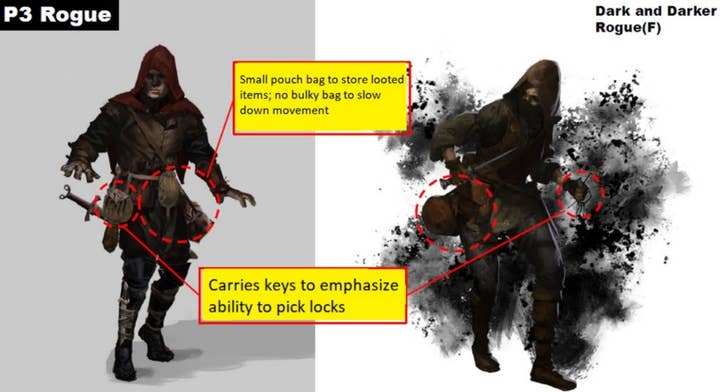
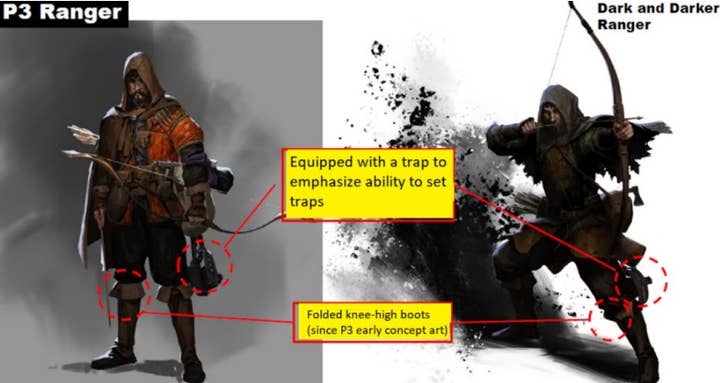
I admit if you showed me these out of context, I'd probably guess they were concept art of the same character in the same game.
But I also couldn't tell you what game they came from, because this is some painfully generic Fantasy 101 stuff right here. Nobody's putting down a preorder because the wizard's got a pointy hat, and it is not a revelation of game design to have character designs that reflect their function in the game in the most basic ways.
Nexon actually understands this argument and attempts to pre-empt it by also including side-by-side comparisons with a third bit of art pulled from the D&D Beyond website that shows a different interpretation of the character class. (Amusingly, the lawsuit mistakenly and repeatedly refers to Dungeons & Dragons owner Wizards of the Coast as "Wizards of the West Coast.")
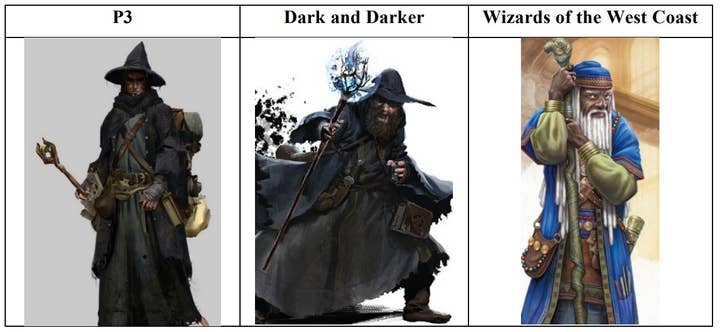
And yeah, that's a different looking wizard. But Dungeons & Dragons has publicly acknowledged making a conscious effort to do things differently.
QUOTE | "One of the explicit design goals of 5th edition D&D is to depict humanity in all its beautiful diversity by depicting characters who represent an array of ethnicities, gender identities, sexual orientations, and beliefs. We want everyone to feel at home around the game table and to see positive reflections of themselves within our products. 'Human' in D&D means everyone, not just fantasy versions of northern Europeans, and the D&D community is now more diverse than it's ever been." – Wizards of the Coast in June of 2020, acknowledging that it was going to be expanding beyond the usual fantasy tropes it helped establish.
Besides, I'm not sure how showing that other people can have actually creative interpretations of the idea means you can start claiming legal ownership of the more generic ones.
Going even further down the road of claiming ownership of other people's ideas, Nexon goes after Ironmace for buying and using Unreal Engine Marketplace assets that it was going to use in Project P3.
QUOTE | "The Unreal Engine Marketplace contains a vast selection of assets. Nexon was required to use creativity to select the assets that best expressed its idea for P3. Defendants copied this creative selection." – Nexon insists its creativity extends beyond the legal team's arguments.
For example, Dark and Darker uses "the same fleshy, bald zombie with eyes that light up." It also has the same skeleton wizard, mimic chest, and cave troll assets.
Doesn't the whole Unreal Engine Marketplace business kind of rely on the assets for sale being generic enough to be usable in a wide variety of games with common settings and styles? If someone's going to be making a living off that storefront, their work is going to be appearing in a lot of games. I'm pretty sure Dark and Darker isn't the only fantasy game out there with skeleton wizards AND cave trolls.
Nexon wasn't just upset about the monster assets though.
QUOTE | "Nexon selected the door below on the left for P3 from the Unreal Engine Marketplace but customized it by making it wider than the stock door. Defendants selected exactly the same door as Nexon for Dark and Darker and, on information and belief, widened it in the same manner."
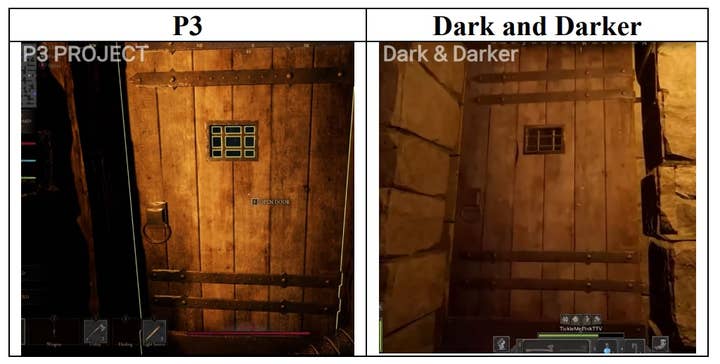
Think before you scale, kids. That could be someone else's creativity you're stealing.
Apparently there is no such thing as too obvious a decision that Nexon won't take exception to Ironmace arriving at the same endpoint.
QUOTE | "Dark and Darker also includes the torch-related game feature, that allows the players to adjust visibility by 'turning on' or 'turning off' the torch." – Nexon calls dibs on torches with gameplay mechanics like "turning on" and "turning off" that are so groundbreaking and high concept that they must be put into quotation marks or people won't understand what they mean.
Nexon believes that the ability of other game developers to use the same assets in its game and dilute the look and feel of its own use of those assets is a violation of its creative rights rather than a baked-in drawback when you decide not to make that stuff yourself but buy it off the shelf of a storefront explicitly created so that any developer working on that engine has access to it.
You can say the same thing about the character designs. Nexon is benefitting from the tropes established by Dungeons & Dragons and so many other creative works but refusing to accept the associated drawbacks. I look at those concept art pieces and I think of Skyrim, King of Dragons, Magician Lord, Thief, and uh... Thief again. (Am I the only one who thinks the rogue and ranger look a little close?)
Nexon admits it's working with highly derivitive components in the suit, but then insists that its own arrangement of them is creative enough to merit protection.
QUOTE | "The law does not treat other creative works in this manner. English language books are protected by copyright, even though they are built from the same twenty-six letters of the alphabet owned by nobody. Most of Western music is built by arranging twelve notes owned by nobody, but songwriters receive broad protection for their works. The Copyright Act does not provide for any lesser protection to video games." – Nexon's lawyers have me wondering if they'll sue us for quoting the lawsuit here.
I'm particularly interested in how much of Nexon's argument seems to rest on its definition of Trade Secrets.
QUOTE | "With its investment of time, money, and effort, Nexon developed numerous types of information that derive independent economic value from not being generally known or being readily ascertainable through proper means ('Trade Secrets')." – The definition Nexon gives in its suit.
Numerous types of information, eh? It would be one thing if Nexon takes a look at the source code and finds that yes, it really is identical to P3 in many places. But the "information" Nexon is describing in this suit is much more mercurial, like knowledge of obvious creative decisions around well-worn tropes, best practices, and player feedback about what was fun.
QUOTE | "Through the playtests, Nexon sought to find the appropriate difficulty level and learning curve (not too easy, but not impossible), balance challenges and rewards throughout the game, implement a player-friendly interface with a captivating game map, attract players with an interesting storyline, finetune high-quality graphics, and develop the overall look and feel of the game—all of which are important aspects of immersive gameplay." – Nexon gives examples of its Trade Secrets.
Yes, all that stuff is valuable knowledge to have when making a game. It's also largely the sort of knowledge I would call "experience." It's less corporate property and more the sort of thing a developer can't help but take with them from job to job.
And as much as I imagine Nexon owns the legal rights to the work these developers created while employed by the company, I would find it hard to share its outrage at this particular arrangement of these ideas being stolen if it was being stolen by the people who arranged them in the first place.
After all, it should not be surprising that when presented with the exact same set of questions around how to create a player-vs-player-vs-enemy first-person shooter with RPG elements inspired by Dungeons & Dragons, the answers the devs would come up with as Ironmace would not be so different from the answers they came up with just months earlier at Nexon.
They've already solved those problems once and they can't simply leave that knowledge and their creative instincts behind when they walk out the door. I don't think Nexon would actually want developers to do that even if they could.
I'm certain Nexon has hired experienced developers and benefitted tremendously in the past from all the playtests those devs had run at previous companies about difficulty curves, player-friendly interfaces, and interesting storylines. Do they really want to argue that knowledge belongs to those previous employers?
Of course, none of that might matter. Perhaps the legal ownership Nexon has over everything in the P3 Project, the non-compete clauses, or a jury largely unfamiliar with standard fantasy tropes makes it a slam dunk for Nexon.
Perhaps they settle, as happened with similar cases involving Zynga, Zynga, Zynga, Zynga, and Zynga.
That has been a common outcome even among non-Zynga cases, at least since Capcom took Data East to court saying Fighters History took too much inspiration from Street Fighter 2, and ultimately lost.
That might be for the best. Even though this case has a fairly unusual set of circumstances, if this goes to trial and a jury decides Nexon's creative work was misappropriated, I worry we would see its legal strategy copied by others, too.
The rest of the week in review
STAT | €706 million ($776 million) – The amount Sega paid to acquire Rovio, citing a desire to accelerate its expansion into mobile gaming as a reason for the purchase.
That's notably less than the €751 million Playtika deal that Rovio refused in January. I think selling to Sega offers far more interesting opportunities than going with a mobile company that has given up on making new mobile games, but both price tags seem awfully high for a one-trick company (unless Sega has plans to reboot Amazing Alex, in which case it's worth every penny).
QUOTE | "Firewalk Studios joining PlayStation Studios is a brilliant move for the team, game, and future players. Our goal at ProbablyMonsters is to find the best path to market for all of our games, and we couldn't be happier for the Firewalk team." – ProbablyMonsters CEO Harold Ryan explains why the company sold Firewalk to Sony when it had already invested years into the multiplayer developer without seeing it launch a single game.
QUOTE | "Focus historically has enjoyed great success in the simulation space and we believe that we can emulate and build on that success with Dovetail. We like their business model based on fully-owned IPs and creating recurrent revenues from regular content updates to a passionate and committed community of fans." – Focus CEO Sean Brennan explains why the company acquired Train Simulator Classic developer and publisher Dovetail Games.
QUOTE | "We are delighted to leverage our experience using Unreal Engine on game development to contribute to the future of Fortnite." - Aquiris CEO Mauricio Longoni explains why the Horizon Chase 2 developer sold itself to Epic Games and changed its name to Epic Games Brasil.
QUOTE | "We had a plan to maybe sell at some point in the future, and then we started talking to Behaviour about doing some work-for-hire work with them, we were talking for months and months, and we realised there's actually a very good synch." – SockMonkey Studios co-founder Bob Makin explains why the work-for-hire studio decided to sell to Behaviour Interactive and become Behaviour UK North.
QUOTE | "CyberConnect 2 will continue to grow and move forward with the experience we have gained in Montreal. Thank you for your understanding, and we look forward to your continued support and guidance." – The Naruto Ultimate Ninja and .hack franchise developer announces that is has shut down the Montreal studio it established in 2016.
STAT | 5% - The year-over-year decline in US consumer spending on games during March, according to Circana (formerly the NPD Group). Hardware and accessory spending were up for the month, but that growth was offset by a 7% decline in the considerably larger software part of the market.
QUOTE | "We're in literally the second inning of the metaverse. The first inning was the dawn of web3 and the initial speculation around NFTs and a lot of bad actors doing pump and dumps. That first inning ended with the crypto crash last year, so now we're in the second inning and basically we're noticing, 'Ok, there's not just people throwing stuff against the wall. There's also thoughtful leaders that have more legitimate projects that are going to start to be coming to market now and find and engage an audience in a more legitimate way.'" – In a keynote address, Trip Hawkins tries to convince the audience at the AARP Gaming Summit that blockchain is not just another attempt to scam money from the elderly. He does not specify who those thoughtful leaders are, or what more legitimate projects they are working on.
STAT | 1:49 – When asked later in the session what kind of use cases will get consumers onboard with NFTs, Hawkins spends one minute and 49 seconds delivering a winding answer about how word-of-mouth used to be limited to the growth rate of the bubonic plague but now social media lets things spread more quickly. He does not suggest a single use case.
STAT | 59% - The percentage of gamers aged 50 and older who said their enjoyment of games was somewhat or strongly decreased by having to watch ads to make progress, as revealed in an AARP survey released alongside the AARP Gaming Summit. It was the most common complaint, followed by needing in-app purchases to make progress (58%), the amount of ads in games (56%), and the number of notifications to purchase things in games (54%).
QUOTE | "It's more than just being physically tired and you take a few days off and it goes away. We're talking about a kind of pervasive, bone-deep, soul-crushing cognitive and emotional weariness that paradoxically interferes with our ability to rest and recover." – Take This clinical director Dr. Raffael Boccamazzo lays out the basics of occupational burnout in our write-up of a GDC panel with developers sharing their personal stories of burnout and recovery.
STAT | "We're seeing lots of people burning out from the industry, and you're seeing high churn rates as well. So, great, you can get the people [from underrepresented groups] in, but what are you doing to retain that talent? Because that's the hard bit. Once you've got them to the doorstep, what support structures do you have in place to help them grow, help them develop, help them become in positions of leadership? Because often that then unlocks the doors to others that are trying to come through." – Looking through this interview with No Code's Romana Ramzan, one might get the idea that making this industry more fair and inclusive for underrepresented groups will actually yield tremendous benefits for basically everyone working in the field, underrepresented or not.
STAT | 0 – The number of games featuring Black women as protagonists that have appeared in the NPD's annual Top 20 best-sellers chart since 1995, as noted by Javon Goard in a guest editorial on the representation of Black women in games.
QUOTE | "Just as companies and workplaces have used generic gamification to coerce people to do things they haven't chosen and aren't in their best interests, the video games industry has repurposed those systems for the same goal: to make as much money as possible." – Adrian Hon, author of "You've Been Played (How Corporations, Governments, and Schools Use Games to Control Us All)," details how utopian promises around gamification have produced little more than dystopian exploitation.
QUOTE | "You have to be in a very controlled environment with the right lighting conditions. If you go to the bathroom, you have to take it off, put it back on, recalibrate everything." – Move CEO Tino Millar helps us in our quest to become the No. 1 Gaming Trade Site for Bathroom Logistics Discourse. (The article is actually about Move's motion capture tech that doesn't rely on cumbersome suits and markers.)
Sign up for the GI Daily here to get the biggest news straight to your inbox
